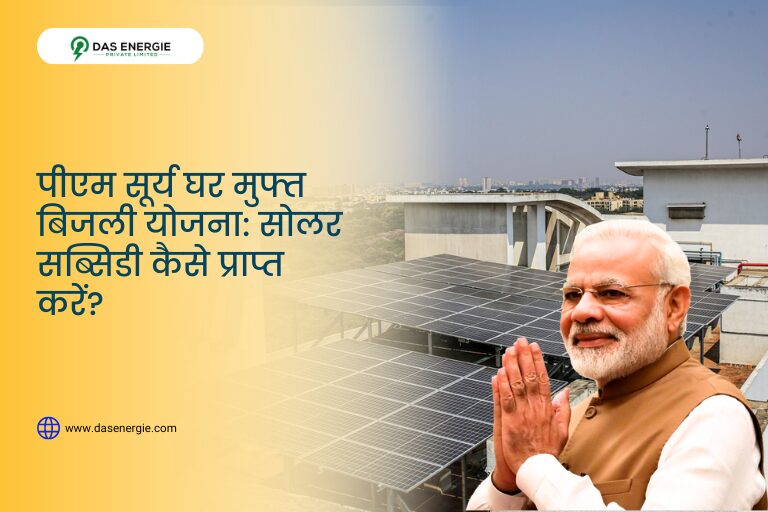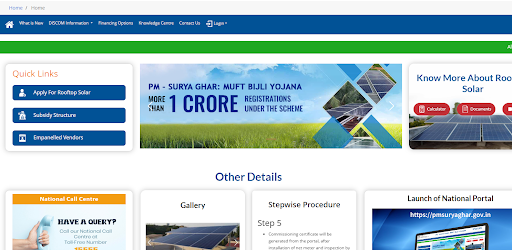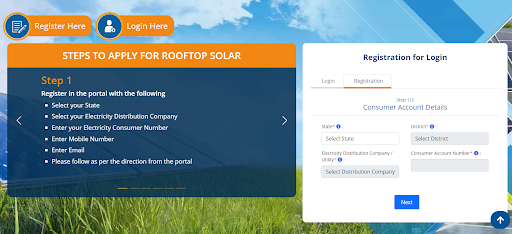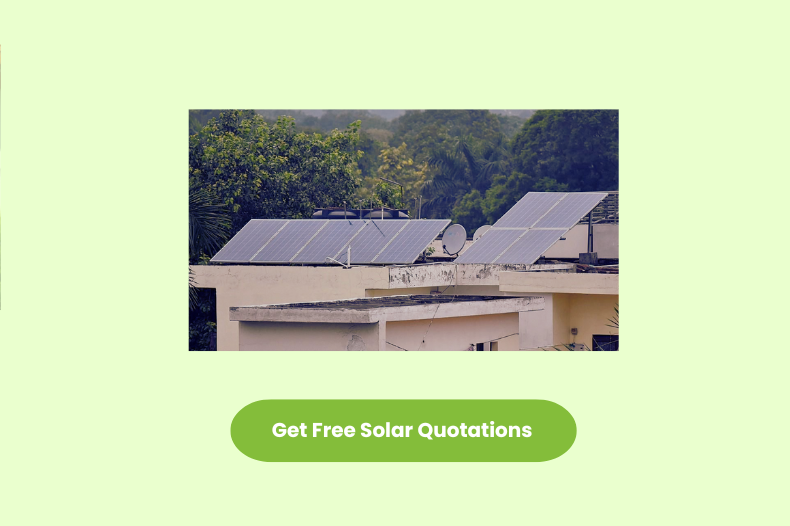पीएम सूर्य घर मुफ्त बिजली योजना: सोलर सब्सिडी कैसे प्राप्त करें?
PM Surya Ghar Muft Bijli Yojana - Steps to Get Solar Subsidy
On 13th February 2024, PM Narendra Modi announced the launch of PM Surya Ghar Rooftop Muft Bijli Yojana on his Twitter handle. He says that the government aims to “light up 1 crore households by providing up to 300 units of free electricity every month” under this yojana. The scheme will help India achieve the target of generating 40 GW of electricity from rooftop solar installations by 2026.
Let’s learn about the subsidy amount, budget allocation, eligibility criteria, and financing options available under the PM Surya Ghar Rooftop Programme.
Table of Contents
ToggleWhat is PM Surya Ghar Muft Bijli Yojana?
पीएम सूर्य घर मुफ्त बिजली योजना क्या है?
You can get a subsidy of up to Rs. 78,000 for installing a rooftop solar system under the PM Surya Ghar Muft Bijli Yojana. While presenting the interim budget in February 2024, Finance Minister Nirmala Sitharaman said that households can save Rs. 15,000-18,000 annually from solar electricity and exporting the surplus to DISCOMs.
The scheme will benefit people in the middle-class and lower-income category and the DISCOMs at the same time.
You can use solar electricity to run your home appliances and charge electric vehicles, in whatever way you want. How DISCOMs will get the benefit? When surplus electricity is exported to the grid, less power will be drawn from the thermal power plant, thus reducing the transmission cost for DISCOMs.
नीचे दिए गए वीडियो से जानिए पीएम नरेंद्र मोदी ने पीएम सूर्य घर मुफ्त बिजली योजना के बारे में क्या कहा:
Why Government Has Launched PM Surya Ghar Scheme?
सरकार ने पीएम सूर्य घर योजना क्यों शुरू की है?
- Achieving the target of generating 40 GW of solar electricity from rooftop installations
- Reduce electricity bills for 1 crore households
- Help people generate free electricity every month
- To encourage people to install rooftop solar installations
- To generate employment and entrepreneurship opportunities in the business of manufacturing and installing solar systems
Budget Allocation under PM Surya Ghar Scheme
पीएम सूर्य घर योजना के तहत बजट आवंटन
The Government of India launched the PM Surya Ghar Muft Bijli Yojana on 13 February 2024. It has allocated Rs. 75,021 crore to it.
Here’s a breakdown of its financial outlay:
| Components of PM Surya Ghar | Financial Outlay |
Central Financial Assitance (CFA) to residential consumers | Rs. 65,700 crore |
| Incentives for DISCOMs | Rs. 4,950 crore (inclusive of total expenditure made under the previous scheme) |
| Incentives for local bodies | Rs. 1,000 crore |
| Model solar villages in each district | Rs. 800 crore |
| Innovative Projects | Rs. 500 crore |
| Payment security mechanism | Rs. 100 crore |
| Capacity building (1% of CFA) | Rs. 657 crore |
| Awareness and outreach (1% of CFA) | Rs. 657 crore |
| Service charges (1% of CFA) | Rs. 657 crore |
| Total | Rs. 75,021 crore |
Subsidy Amount of PM Surya Ghar Muft Bijli Yojana
पीएम सूर्य घर मुफ्त बिजली योजना की सब्सिडी राशि
The subsidy amount ranges between Rs.30,000 and Rs.78,000 for households, depending on the capacity of the solar system you install.
पीएम सूर्य घर योजना के तहत उपलब्ध सब्सिडी राशियाँ नीचे दी गई हैं:
| Solar System Capacity | Subsidy Amount |
| 1 kW | Rs. 30,000 |
| 2 kW | Rs. 60,000 |
| 3 kW | Rs. 78,000 |
| Over 3 kW | Rs. 78,000 |
PM Surya Ghar Yojana Eligibility Criteria
पीएम सूर्य घर योजना के लिए अनिवार्य आवश्यकताएं
You have to fulfil the following eligibility requirements to get the PM Surya Ghar Scheme subsidy:
1. Solar Panel Must be DCR-Certified and ALMM-Listed
To be eligible for the PM Surya Ghar Yojana, your panels must be DCR-certified and the model must be listed in the ALMM. DCR and ALMM stand for ‘Domestic Content Requirement’ and ‘Approved List of Models and Manufacturers’.
The Ministry of New and Renewable Energy (MNRE) has introduced these criteria to ensure quality standards for panels to be used in solar systems eligible for a subsidy. For a solar panel to be DCR-certified, its components, including the solar cells, must be made in India.
The ALMM lists the types of solar panel models and their manufacturers which have been approved by the MNRE. You can find this ALMM module list on the PM Surya Ghar Portal.
To stay on the safe side, use Das Energie to get in touch with vendors who install DCR-certified solar panels for you. You can check the brand name, model number, type, etc., about the solar panel and other equipment on the quotation itself.
2. Enlisting of DISCOM with MNRE
Your DISCOM must be enlisted with the MNRE for you to be eligible for the subsidy. You can find out if your DISCOM is enlisted by visiting the PM Surya Ghar Official website.
At Das Energie, we help you receive rooftop solar installation quotations from vetted DISCOM-registered installers near your location. Our installation partners adhere to all the necessary government guidelines so that you can get the PM Surya Ghar Solar Scheme Subsidy.
3. DISCOM-Empanelled Vendor for Solar Installation
For installing your solar system, you must contact a vendor who is empanelled with your DISCOM. The list of DISCOM-empanelled vendors can be found on the PM Surya Ghar portal.
How to Apply For PM Surya Ghar Yojana Online?
पीएम सूर्य घर योजना के लिए ऑनलाइन आवेदन कैसे करें?
पीएम सूर्य घर सब्सिडी के लिए ऑनलाइन आवेदन करने के लिए आपको नीचे बताए गए तरीके एक-एक करके अनुसरण करने होंगे:
Step 1: Go to the PM Surya Ghar Yojana Portal.
Step 2: Click on ‘Apply for Rooftop Solar’.
Step 3: Enter the name of your state, DISCOM, consumer number, mobile number, and email to finish your registration.
Step 4: Log in using your consumer number and mobile number.
Step 5: Fill out and submit the online application form for on-grid solar system installation with a subsidy.
Step 6: DISCOM will verify your application and give a feasibility approval for installation.
Step 7: Ask a DISCOM-empanelled vendor to install the solar system.
Step 8: Submit an application to your DISCOM for a net metering connection.
Step 9: The DISCOM will install the net meter, test and inspect it, and generate a commissioning certificate.
Step 10: Once you get your commissioning certificate, you have to submit it along with copies of your savings account passbook and a cancelled cheque through the Pm Surya Ghar website.
You will get the subsidy into your bank account within 30 days.
Documents Required for PM Surya Ghar Scheme
पीएम सूर्य घर योजना के लिए आवश्यक दस्तावेज
पीएम सूर्य घर योजना के लिए आवेदन करने के लिए आपको निम्नलिखित दस्तावेज जमा करने होंगे:
- Any electricity bill from the last 6 months
- Project completion report
- Commissioning certificate
- Photograph of rooftop solar installation
- Consumer-vendor agreement
- Savings account passbook
Solar Installation Cost After PM Surya Ghar Yojana
पीएम सूर्य घर योजना के बाद सौर पैनल स्थापना के लागत
The following are the solar installation costs before and after availing the PM Surya Ghar Muft Bijli Yojana:
| Rooftop Solar Capacity | Total Installation Cost | Subsidy | Installation Cost after Subsidy |
| 1 kW | Rs.90,000 | Rs. 30,000 | Rs. 60,000 |
| 2 kW | Rs. 1,40,000 | Rs. 60,000 | Rs. 80,000 |
| 3 kW | Rs. 1,90,000 | Rs. 78,000 | Rs. 1,12,000 |
| 4 kW | Rs. 2,40,000 | Rs. 78,000 | Rs. 1,62,000 |
| 5 kW | Rs. 2,90,000 | Rs. 78,000 | Rs. 2,12,000 |
| 6 kW | Rs. 3,40,000 | Rs. 78,000 | Rs. 2,62,000 |
| 8 kW | Rs. 4,40,000 | Rs. 78,000 | Rs. 3,62,000 |
| 10 kW | Rs. 5,40,000 | Rs. 78,000 | Rs. 4,62,000 |
Financing Options for Solar Installation with PM Surya Ghar Scheme
पीएम सूर्य घर योजना के साथ सौर ऊर्जा स्थापना के लिए ऋण विकल्प
You can take a loan to finance the installation of your solar system. Here’s how to find the financing options under the scheme:
Step 1: Visit the website of PM Surya Ghar.
Step 2: Click on ‘Financing Options’ from the navigation bar on the top.
Step 3: Select the name of the bank on the left side and click on either ‘Product 1’ (for capacity of up to 3 kW) or ‘Product 2’ (for capacity from 4 kW to 10 kW) to review the loan options.
PM Surya Ghar Yojana vs. Previous Solar Subsidy Scheme
पीएम सूर्य घर योजना vs पिछली सौर सब्सिडी योजना
Before the PM Surya Ghar scheme, the government had been running the PM Rooftop Solar Programme to encourage rooftop solar system installation. The subsidy amount was different for general states and union territories (UTs) and special states and UTs.
The special states were Sikkim, Uttarakhand, and Himachal Pradesh.
The special union territories were Jammu and Kashmir, Ladakh, Lakshadweep, and Andaman and Nicobar Islands.
Below, we have compared the PM Surya Ghar scheme with the Rooftop Solar Programme.
1. PM Surya Ghar vs PM Rooftop Solar Programme for Individual Households
Below you can find a comparison between the subsidy under PM Surya Ghar and the Rooftop Solar Programme for individual households:
| Capacity of Solar System | Financial Assistance in General States/Union Territories | Financial Assistance in Special Category States/Union Territories | PM Surya Ghar: Muft Bijli Yojana |
| 0-2 kW | Rs. 18,000/kW | Rs. 20,000/kW | Rs. 30,000/kW |
| At 3 kW | Rs. 18,000/kW | Rs. 20,000/kW | Rs. 30,000/kW for the first 2 kW and Rs. 18,000 for the remaining 1 kW. |
| Above 3 kW and up to 10 kW | Rs. 18,000/kW for the first 3 kW and Rs. 9,000/kW thereafter | Rs. 20,000/kW for the first 3 kW and Rs. 10,000/kW thereafter | Rs. 30,000/kW for the first 2 kW and Rs. 18,000 for the remaining 1 kW. Subsidy is capped at Rs. 78,000 |
2. PM Surya Ghar vs PM Rooftop Solar Programme for Residential Areas
Here is a comparison between the subsidies for Residential Welfare Associations (RWA) and Group Housing Societies (GHS) under the PM Surya Ghar scheme and Rooftop Solar Programme.
| Capacity of Solar System | Financial Assistance in General States/Union Territories | Financial Assistance in Special Category States/Union Territories | PM Surya Ghar: Muft Bijli Yojana |
| Up to 500 kW | Rs. 9,000/kW | Rs. 10,000/kW | Rs. 18,000/kW |
The PM Surya Ghar Muft Bijli Yojana has the potential to take India’s solar energy generation to new heights. It lets you enjoy a subsidy of up to Rs. 78,000 for installing an ongrid rooftop solar system. With net metering, you can export the surplus electricity to your DISCOM’s grid and import that later in the night.
FAQs about PM Surya Ghar Muft Bijli Yojana
No, if you have already received financial assistance from the central government for installing a solar system, you are not eligible for the PM Surya Ghar Yojana.
You can find the list of empanelled vendors by visiting the official website of PM Surya Ghar Scheme. Go to the home page and click on ‘Empanelled Vendors’ to find the list.
You can use the online calculator available on the PM Surya Ghar website to calculate the ideal capacity of your solar system.
DCR stands for Domestic Content Requirement. In a DCR module, all its components are made in India. Installing rooftop solar panels with DCR certification is mandatory for getting the PM Surya Ghar subsidy.
ALMM stands for Approved list of models and manufacturers. It is a list of solar panel models and manufacturers approved by the Ministry of New & Renewable Energy (MNRE).
You have to visit the website of PM Surya Ghar and create an account to register for the scheme. After applying, you will get the feasibility approval and after installation, you will get the commissioning certificate. For the subsidy, you will have to apply again with the necessary documents.
PM Surya Ghar Muft Bijli Yojana is only available for on-grid solar systems. As net metering is a necessity for on-grid solar systems, you need to install a net meter.







